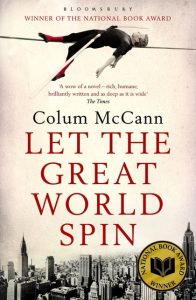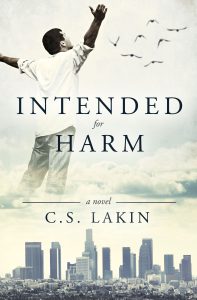Masterful Voice in Novels Part 3
I want to share a bit from Colum McCann’s personal remarks at the back of his award-winning novel Let the Great World Spin, my hands-down favorite novel for showing masterful “stream of consciousness” character voice.
If you’ve missed the other posts (here and here) on masterful voice, they emphasize the (my) opinion that voice is all about the character. A writer’s style is a wholly different thing, but I won’t get into that again here.
What I may be sharing here may seem unrelated to masterful voice, but, in fact, it’s intrinsically related.
McCann opens this section talking about a personal experience: his father-in-law’s story of surviving the 9-11 attacks on the Trade Towers in New York. In his exquisite writing style, McCann recounts how the man hurried down from the 59th floor, sloshed through water and the maelstrom that was the disaster in Lower Manhattan, and walked to McCann’s apartment, throwing everything away but his shoes, which he perhaps forgot he’d left by the door (and which McCann kept).
He writes: “I still think that every touch of them loses a little more dust. I am paralyzed by the notion of what the dust might contain—a resume, a concrete girder, Sheetrock, a briefcase, a pummeled earring, an eyelash, another man’s shoe. They sit in a cupboard behind me, in my writing room, over my left shoulder, a responsibility to the past.”
McCann goes on to write about Manhattan in the days after the attack, then says, “The question, as a writer, was how to find meaning at all when there was, in plain sight, a world charged with meaning. If everything meant something … was it possible to create an alternative meaning, or more exactly, a novel?”
Here’s the point I want to get to. McCann posits:
But stories are there to be told, and each story changes with the telling. Time changes them. Logic changes them. Grammar changes them. History changes them. Each story is shifted sideways by each day that unfolds. Nothing ends. The only thing that matters, as Faulkner once put it, is the human heart in conflict with itself. At the heart of all this is the possibility, or desire, to create a piece of art that talks to the human instinct for recovery and joy.
The only thing that matters, as Faulkner once put it, is the human heart in conflict with itself.
What Does This Have to Do with Voice?
I often talk about passion. The passion we writers must have for the power of words, for storytelling. The passion our characters must have, which is fueled by their core need, their deep-seated fears and wounds, their beliefs.
This is all true and important.
But if all you have are a bunch of highly passionate characters running amok in your novel, does that mean you have a compelling cast of characters, a compelling story? Not necessarily.
Another maxim about writing fiction I’ve shared often is “Conflict is story.” I look for conflict—inner and/or outer—on every page of a manuscript. Conflict creates the necessary microtension needed to keep readers engaged and turning pages.
 Think about taping Faulkner’s words to your computer or pinning them on your wall: The only thing that matters is the human heart in conflict with itself.
Think about taping Faulkner’s words to your computer or pinning them on your wall: The only thing that matters is the human heart in conflict with itself.
When you create rich characters in conflict with themselves, which mirrors real life, you are on your way to creating masterful voices in your fiction.
Maybe this sounds like a convoluted way to crafting masterful voice, but I think not. I think it’s the key.
Let the Great World Spin, a novel about various lives of characters on the day Phillipe Petit danced back and forth on a high wire between the Trade Towers, exemplifies the mastery of the “stream of consciousness” voice. I devoured this novel as I began to write Intended for Harm, my literary modern-day novel about the biblical story of Jacob and Joseph, set in Los Angeles between 1971 and present day. McCann’s masterful voices set my writing afire, and in three months I had spun a tale 165,000 words long with hardly taking a breath.
Let’s look at some passages from McCann’s novel.
From outside, the sounds of Park Avenue. Quiet. Ordered. Controlled. Still, the nerves jangle in her. Soon she will receive the women. The prospect ties a small knot at the base of her spine. She brings her hands to her elbows, hugs her forearms. The wind ruffles the light curtains at the window. Alencon lace. Handmade, tatted, with silk trimmings. Never much for French lace. She would have preferred an ordinary fabric, a light voile. The lace was Solomon’s idea, long ago. The stuff of marriage. The good glue. He brought her breakfast this morning, on the three-handled tray. Croissant, lightly glazed. Chamomile tea. A little slice of lemon on the side. He even lay down on the bed in his suit and touched her hair. Kissed her before he left. Solomon, wise Solomon, briefcase in hand, off downtown. The slight waddles in his step. The clack of his polished shoes on the marble floor. His low-growled good-bye. Not mean, just throaty. Sometimes it strikes her—there is my husband. There he goes. Same way he’s been going for thirty-one years. And then a sort of silence interrupted. The drifting sounds, the snap of the lock, the dim bell, the elevator boy—G’morning, Mr. Soderberg!—the whine of the door, the clank of machinery, the soft murmur of descent, the clanging stop at the lobby below, the roundelay of the cables rising. . . .
He does not even know about the visitors—she will tell him sometime, but not yet, no harm. Perhaps this evening. At dinner. Candle and wine. Guess what, Sol. As he settles in the chair, fork poised. Guess what. A slight sigh from him. Just tell me, Claire, honey—I’ve had a long day. . . .
Things to do. Hurryhurry. Toilet. Toothbrush rub. A light swish of makeup. Some blush. A little eyeliner and a lipstick dab. Never one to fuss with makeup. . . . Turns to the mirror. Odd to see the strain of her neck. Not mine. Not that neck. Fifty-two years in that same skin. She extends her chin and her skin tightens. Vain, but better. The earrings against her dress. Seashell with seashell. She sells. By the shore. She drops them in the jewelry box and scatter-searches through. Casts a look at the dresser clock.
Quick quick.
Almost time. . . .
Claire had told them, at the first meeting, that she lived on the East Side, that was all, but they must have known, even though she wore long pants and sneakers, no jewelry at all, must have intuited anyway, that is was the Upper East Side, and then Janet, the blonde, leaned forward and piped up: Oh, we didn’t know you lived up there.
Up there. As if it were somewhere to climb. As if they would have to ascend to it. Ropes and helmets and carabiners.
I omitted a lot of other little beautiful details in order to give a kind of sweeping sense of Claire’s thoughts as she gets ready to entertain these women—who gather each month at one anothers’ apartments, in commiseration of their losses (their sons all died in the Vietnam War). And the scene masterfully continues with the women arriving, showing Claire’s nervousness throughout, her difficulty in “acting normal” as she tries to keep her pain buried.
The discussion leads to the curious event of the day—the man walking the high wire—but the story of Claire is one of the human heart in conflict with itself.
Claire is just one of the many “voices” in this amazing novel. I’ll share some other characters and their voices from Let the Great World Spin in the next post. I hope you see how voice is all about the character, and a masterful writer will bring that voice out strong and powerfully in the pages of a novel.
Before I conclude, I’ll share a passage from my novel, Intended for Harm.
Leah moved through the kitchen with efficiency. Made dinner, set the table, even folded the laundry and put clothes in drawers, clean towels in the bathroom. A simple penance in advance, a gesture, hopefully one that would soften the blow. Although she knew it wouldn’t. Nothing would. But she couldn’t let herself think on it. Survival was paramount. If she remained, death was certain—if not literal, then emotional. She’d weighed choices over and over until they became too heavy to hold any longer. She had a fleeting opportunity, had to grab it with both hands or she would miss the golden ring; it would fly past her, irretrievable, and she would languish with longing, regret, the bitterness ebbing away at her until nothing remained.
She called her children in to eat, checked the clock again. Five minutes.
That Paul Simon song came to mind—“Fifty Ways to Leave Your Lover.” You just slip out the back, Jack. Make a new plan, Stan. Don’t need to be coy, Roy. Just get yourself free. When her children were situated at the table, she looked at each one, putting their sweet faces to memory. She went into the bathroom, brushed her hair and washed her face, came out, checked her purse. She took out her prescription bottles; she wouldn’t need those happy pills anymore. Pills that mollified and simplified and verified and nullified.
Just hop on the bus, Gus. Don’t need to discuss much.
Simon had set the camera on the table. She put it in her sweater pocket. Reuben only looked at her as she stood by the door and rummaged through her purse.
Just drop off the key, Lee. And get yourself free.
A honk from the street. Leah looked out the window and saw the band van—an old VW bus, orange and white, with a pop-up camper top. Denny waved from the front seat, sitting next to Barry, who was driving. Five thirty on the dot. She deposited her key ring on the little shelf. She wouldn’t need them anymore—those keys that opened doors and started engines and kept her world running on empty.
Simon ran over to her, grabbed her arm, searched her eyes, demanding to know what she was doing, where she was going. She could tell from his face that he knew she was leaving, the way he always understood her, felt her moods as subtle ocean currents. She would not be able to lie to him that easily, but she would this one time, to stave off the inevitable, the unbearable, the unthinkable. She could not let anything buck her resolve, unsure how strong the tensile strength of her nerve.
“Sweet Simon, I’m just going to play some music.”
“No you’re not. You’re taking all your clothes. You’re leaving us!” He body-blocked her, his back against the front door.
Leah closed her eyes, imagined cool water putting out his frenzied fire as his cries erupted, flare-ups of ignited fear encircling her, the lava threatening to burn her from the toes up.
“Simon, I have to. Go. I’ll write. I’ll be back.” She gulped as the worst word emerged from her throat. “Soon.” Followed by two more horrible, evil words, but she had no choice; they must be said.
“I promise.”
 She couldn’t look at him, touch him, hug him good-bye. Couldn’t look at any of them, the house, their things, this composite life whose elements had defined and held her together with flimsy string all these years. She shook it off, a dead molted skin, pushed Simon away from the door, pulled it open against his feeble resistance. “Reuben, hold Simon. Don’t let him outside. That’s a good boy.” She held the door half open until Reuben came and took his younger brother by the arm, tugged him away from the door as Simon wailed, his cry so pathetic and terrible Leah wished she had no ears. She caught Reuben’s hurt splattered all over his face, knew he wouldn’t challenge her, her good dutiful trusting firstborn son.
She couldn’t look at him, touch him, hug him good-bye. Couldn’t look at any of them, the house, their things, this composite life whose elements had defined and held her together with flimsy string all these years. She shook it off, a dead molted skin, pushed Simon away from the door, pulled it open against his feeble resistance. “Reuben, hold Simon. Don’t let him outside. That’s a good boy.” She held the door half open until Reuben came and took his younger brother by the arm, tugged him away from the door as Simon wailed, his cry so pathetic and terrible Leah wished she had no ears. She caught Reuben’s hurt splattered all over his face, knew he wouldn’t challenge her, her good dutiful trusting firstborn son.
Be a rock, Reuben. Barricade the door. Keep Simon in and reality out. Until your father comes home. Then you can crumble into dust.
Character is all about voice. About their inner conflict. The sooner you understand this, the sooner you will be on your way to writing masterfully. Read masterful writers. Get inspired.
Your thoughts on the post? On how characters are revealed through their “voice”?









Nice post, Suzanne. Thanks. I was moved by LTGWS — it was one of those books I didn’t fully understand until about a week after I’d closed the cover. Your extract from Claire’s story was from one of the best segments of the book. On Stream of Consciousness — I think Woolf did it best, in, e.g., Dalloway or Lighthouse. That was believable psychology to me. Sentence fragments are not sufficient in themselves although I admit, as a psychologist, I have preconceptions about what consciousness should look like. As for voice, a difficult topic indeed, Claire had it, in LTGWS, and so did her husband, the judge. I’m not sure why those two were so strong. But not the brothers, I thought, nor the hookers, and not most other characters. McCann’s narrator had a strong voice, a certain distant, reflective (horrified?) tone that I think carried the book. How did that work? Not by stream of consciousness. I don’t know how he did it. There was something allusive about that narrator’s voice, something that didn’t say exactly what was on its mind; a vague, dissonant rumble. I wish I could pin that down and copy it. Thanks for a provocative post. (And nice meeting you at the recent SFWC). Love the blog.
Another wonderful post, Susanne. Your stream of consciousness is great. The reader sees the struggle Leah is in to leave behind her children. They seem young. We don’t know why she needs to leave but understand that something may be wrong with her…possibly mentally because of the medication. Really great writing. All best to you.
Thank you. Of course, if you read the novel, you’ll have it all in context, since this is many chapters in, after Jake marries Leah.